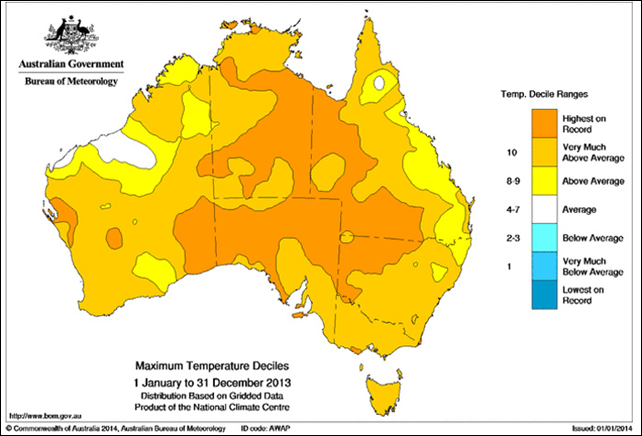2013 was hottest year on record in Australia – PM Tony Abbott urged to rethink climate policy
3 January 2014 (ABC) – Australia has just sweltered through its hottest year on record, according to the Bureau of Meteorology. Average temperatures were 1.20 degrees Celsius above the long-term average of 21.8C, breaking the previous record set in 2005 by 0.17C, the bureau said in its Annual Climate Statement. All states and territories recorded above average temperatures in 2013, with Western Australia, Northern Territory and South Australia all breaking annual average temperature records. And every month of 2013 had national average temperatures at least 0.5C above normal, according to the statement. The country recorded its hottest day on January 7 – a month which also saw the hottest week and hottest month since records began in 1910. A new record was set for the number of consecutive days the national average temperature exceeded 39C – seven days between January 2 and 8, 2013, almost doubling the previous record of four consecutive days in 1973. The highest temperature recorded during 2013 was 49.6C at Moomba in South Australia on January 12, which was the highest temperature in Australia since 1998. Further, with mean temperatures across Australia generally well above average since September 2012, long periods of warmer-than-average days have been common, with a distinct lack of cold weather, the statement says.
Nights have also been warmer than average, but less so than days. The country has experienced just one cooler-than-average year in the last decade – 2011. Australian temperatures have warmed approximately 1C since 1950, consistent with global climate trends. Globally, each of the past 13 years since 2001 have ranked among the 14 warmest on record. The bureau’s Neil Plummer told News 24 that as a predictor of climate in Australia, the statistics “speak for themselves”, and that a “consistent body of evidence” gathered globally pointed to a “warming trend”. “All Australian records go back to 1910. The trend over that period is a little short of a degree warming over that period, where most of the warming has occurred since around about 1950, and that’s consistent with the global pattern,” he said. “It’s not just us at the bureau doing the number crunching, it is all the bureaus around the world, and it is that body of evidence that we’re all seeing a warming over Australia and a warming world.” [more]
2013 was hottest year on record in Australia, Bureau of Meteorology says
By Daniel Hurst, political correspondent
3 January 2014 (theguardian.com) – Tony Abbott’s political opponents have seized on confirmation that 2013 was Australia’s hottest year on record, arguing it should compel the prime minister to abandon his plans to scrap the nation’s carbon pricing laws. Labor and the Greens used the latest Bureau of Meteorology records to demand the Abbott government rethink its policies on climate change. The acting Greens leader, Richard Di Natale, branded Abbott a “reckless ideologue who ignores the science and is intent on listening to people who are part of the tinfoil hat brigade”. Abbott went to the election in September with a promise to scrap the carbon tax and replace it with his “direct action” policy – including tree planting and an emissions reduction fund to provide incentives for cutting greenhouse gas output. Labor and the Greens have refused to support the carbon price repeal bills in the upper house, making it likely Abbott will have to wait until the new Senate composition takes effect in July to pass the laws. Labor maintains its support for an emissions trading scheme and advocates moving from the current fixed carbon price to a lower, floating price this July – a year earlier than legislated by the Gillard government. In its annual climate statement, the bureau said 2013 was Australia’s warmest year since records began in 1910, with a mean temperature 1.2C above the 1961-1990 average and 0.17C above the previous record set in 2005. The acting Labor leader, Penny Wong, said the bureau was an institution well respected by Australians and its “deeply concerning” findings about warming trends confirmed “yet again” that climate change was real. “In fact, the only people that don’t believe that climate change is real are prime minister Abbott, his cabinet and some of his advisers,” Wong told reporters in Adelaide. “He thinks it’s absolute crap and the policy he has is a con job that you have when you think climate change is absolute crap.” [more]
Tony Abbott urged to rethink climate policy after hottest year on record

